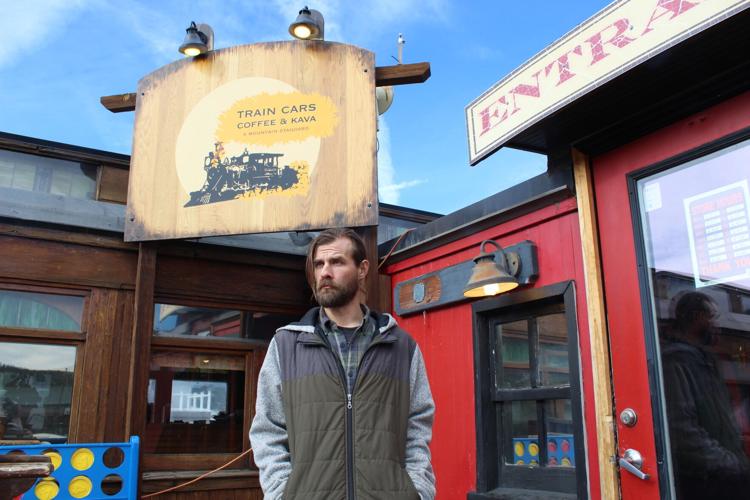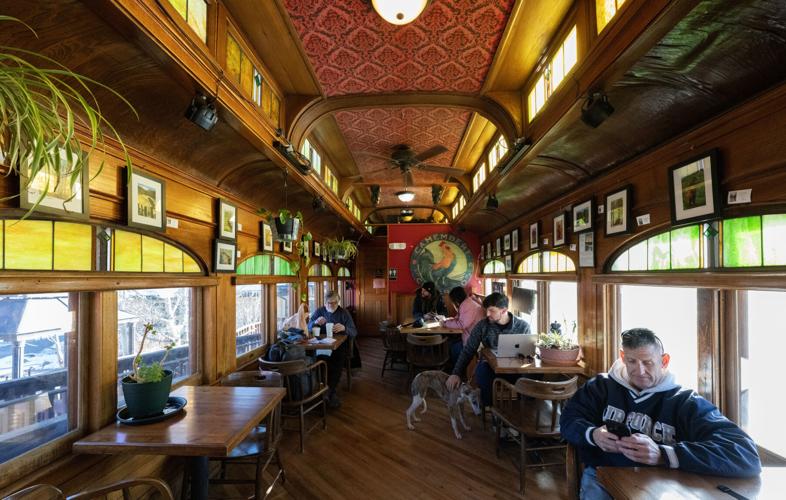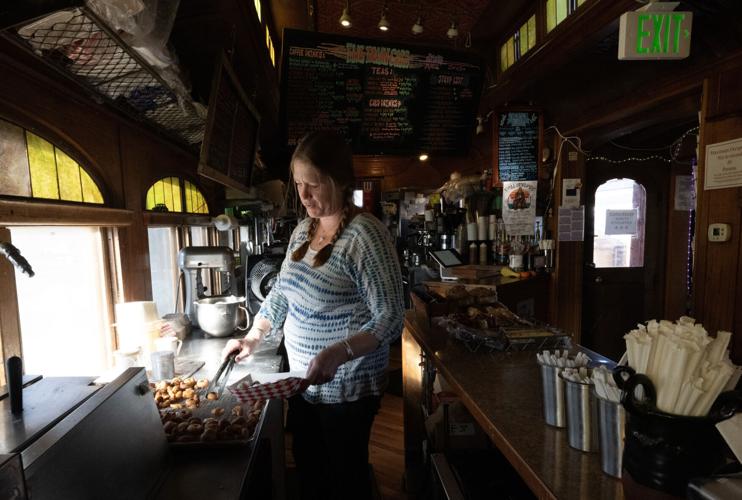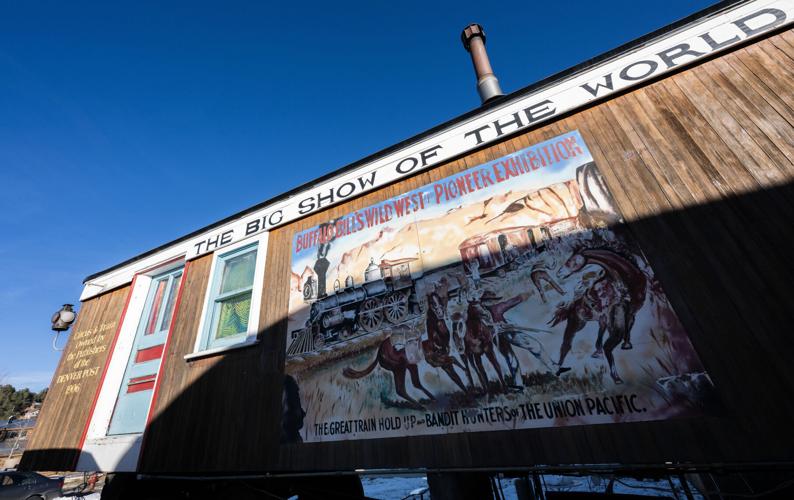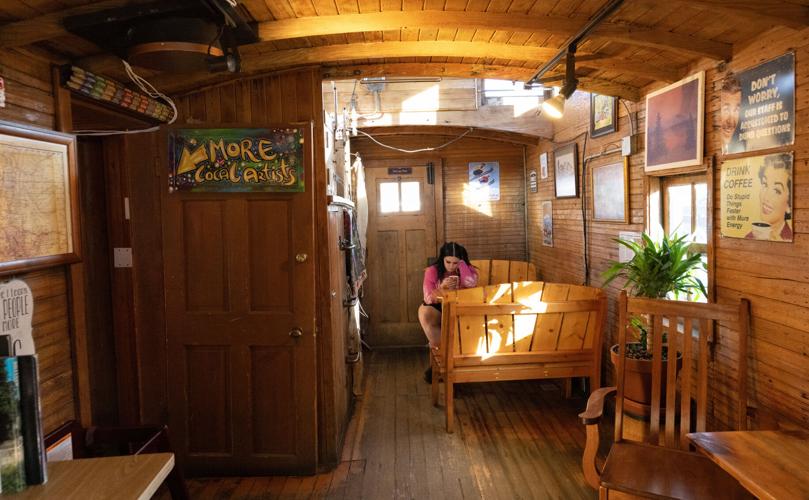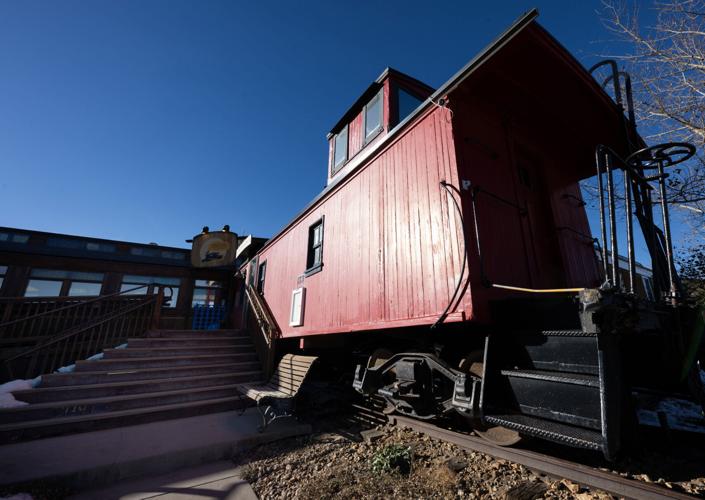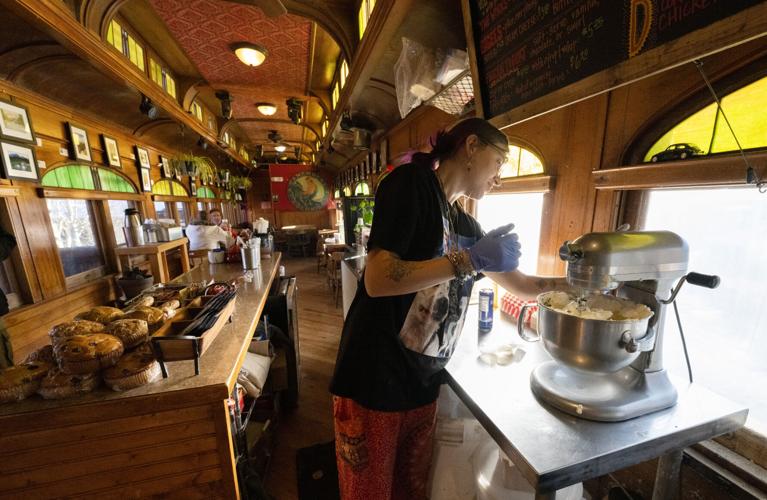Colorado’s most curious coffee shop is inside historic train cars
NEDERLAND • The wood floor in the train car had to be replaced. Business had to close one recent week.
“We don’t like closing for a week, but we would rather do that and maintain the integrity of a place like this,” said Jesse Fox, owner of perhaps Colorado’s most unique coffee shop.
It was a week for reflecting on these historic train cars, the three of them forming the bright red landmark at the corner of this little mountain town west of Boulder.
“I’ve seen these trains in different states over the years,” Fox went on. “And what I’ve realized is the more you put into them, the more they give back. I don’t know if that’s strictly a thing you could say with all businesses, or if there’s an energetic sense to these trains.”
They’ve given back to him in immeasurable ways. And they’ve given back to Nederland — a fitting, funky landmark neighboring the similarly fitting Carousel of Happiness.
Train Cars Coffee & Kava fits into the town’s fabric.
“One of the main threads I’d even venture to say,” said manager Robin Svenson.
She’s known the coffee shop here for as long as she’s been around, almost 20 years. She’s known the surprised reactions of travelers, many of them stopping before the scenic Peak to Peak Highway.
“People have that sense of happening upon this place,” Svenson said. “That can be magical.”
A sense of magic — that was the historic aim of one of the cars. That’s the car with a colorful mural and proclamation on its exterior: “THE BIG SHOW OF THE WORLD.”
Originally providing postal service along the Union Pacific Railroad in 1872, the car went on to advertise the traveling Sells-Floto Circus in 1906. Before joining the Ringling Bros. and Barnum and Bailey Circus, this was the circus that hosted Buffalo Bill’s “Wild West Show.” Which explains the memorabilia around today’s coffee drinkers.
They are drinking coffee and munching on the “world famous” mini doughnuts. The doughnuts are fried and topped with the time-honored “works” — powdered sugar, chocolate, caramel, whipped cream and sprinkles — in an old Pullman Co.-made coach car.
The kitchen flooring is new, yes, but much else remains original: the mahogany walls, the wallpaper ceiling, the stained-glass windows. Dating to 1906, the Pullman “was one of the last plush wooden coaches and served as a dining car,” reads the car’s history, posted nearby.
“If you were riding in a Pullman dining car, you definitely had money at that point in time in history,” Fox said.
Now he welcomes any and all: the traveling well-to-do out of Boulder, the wandering soul of Nederland, families from near and far who stop for regularly scheduled live music.
“I have seen so many meaningful connections made at the Train Cars,” Fox said.
“People who are at a really hard place finding the right person that might have housing for them or resources. … I’ve seen people meet their future spouses on the trains. I’ve seen people grow up and get their first job on the trains; they ate the doughnuts growing up and now they’re making them. … We’ve had a lot of community members, everyday regulars, they pass away, and we’ve done some of their celebrations of life.”
It all started with a man “of a very unusual nature,” reads another bit of history posted nearby, penned by Pam North.
Jimmy Keith was known to have studied wolves and coyotes at the University of Colorado-Boulder before turning to the historic interest of his family. The family had built railroad cars in the industry’s heyday. Keith went searching for that history; he acquired an old caboose in 1971 and lived in it for a while.
He later laid eyes on the Pullman coach.
“Keith had spotted it sitting on an island in a pond near the Boulder Turnpike, where it had been moved by its owner after purchase from the Colorado Southern Railroad,” reads North’s account. “The car was inhabited by a colony of bees, and the threat of stings had the inadvertently beneficial effect of protecting the car’s desirable stained-glass windows from being stolen.”
Keith later discovered the circus car, hiding in a farm shed out on the eastern plains. The acquisitions combined for a vision, North wrote: “to locate the pair at the corner of what is now the Caribou Shopping Center parking lot (at that time it was just a field with no surrounding buildings).”
Despite some pushback from residents and officials “who did not quite know what to make of his offbeat project,” Keith and his wife opened an antique shop in the train cars. They ran it for several years, until the time to sell came up in the local newspaper, The Mountain-Ear, in 1987.
The paper quoted Keith: “A great idea could buy the cars for little money. A horrible idea would cost a whole lot of money.”
The message was clear: The cars were to serve the community. Along came the coffee shop concept.
And much later, around 2012, along came Fox.
He found himself in the mountains of Nederland along a twisting, turning path out of his native Vermont. Years earlier he had parted with his possessions and hit the road, “trying to run away from myself,” he said.
Fox hitchhiked, worked odd jobs here and there, “doing that thing people do in their 20s,” he said. “I ended up out here, and I still had a lot of personal defects that I probably wasn’t recognizing at that time.”
He recognized himself as an alcoholic. This was among broader realizations that came with having a child. “That changed my entire perspective on life and the world,” he said.
He settled into sobriety, settled into work as a barista at what was then Train Cars Coffee and Frozen Yogurt. He found Jesus. He found himself to be a softer person. Just as customers became “like family” to him, he returned the love; he’d use his tips to buy someone in need something to eat or drink.
Someone at some point gave him the odd nickname Gangster of Love. It was odd, but Fox liked the thought: “Love in the sense of that universal love we should all be striving for toward one another, even when we fall short.”
It was in this spirit that the business came to him a couple of years ago. The previous owner was retiring, “and we were able to work out a way to keep the business within the local community,” Fox said. “He wanted to pass it on to someone who knew the business.”
Fox wanted to add something personal. While frozen yogurt is still served, the name is now Train Cars Coffee & Kava, for the root-based beverage.
“That was part of my sobriety journey, discovering kava,” Fox said. “After I had done a lot of the self-searching and self-discovery that sobriety brings, it was a great way a few years later, when kava bars started popping up, where I could go out and be social and not feel the need to be around a bunch of alcohol.”
Now others might discover kava in this old Pullman coach — but one point of discovery here.
It’s the oddity of the train cars, the colorful history, that brings people in. Regulars, meanwhile, return for something familiar, the manager thinks.
Perhaps more than the locally roasted coffee, “I think it’s very nostalgic,” Svenson said.
And “very warm,” she added, quaint and comforting — best showcased at the start of the day, when the sun crests the mountains and a glow spills through the stained-glass windows.
“It’s so beautiful when the sunrise comes through,” Svenson said. “Just lights it all up.”





